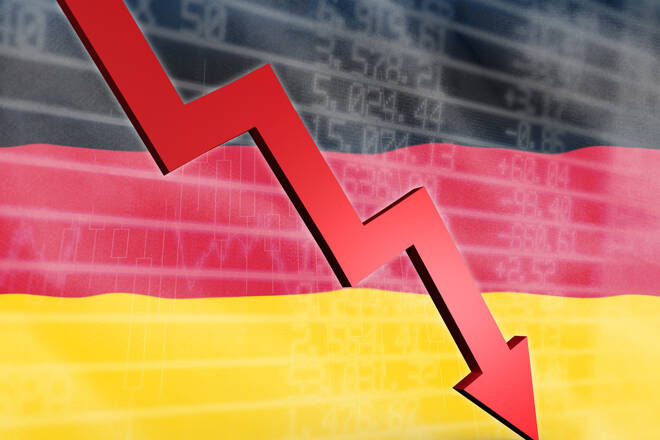Advertisement
Advertisement
European Equities: A Week in Review – 21/01/22
By:
Market jitters over FED monetary policy send the NASDAQ into corrective territory and the European majors into the deep red.
The Majors
It was a particularly bearish week for the European majors in the week ending 21st January.
The DAX slid by 1.76%, with the CAC40 and the EuroStoxx600 ending the week down by 1.04% and by 1.40% respectively.
Economic data from the Eurozone and ECB monetary policy took a back seat in the week. Market sentiment towards FED monetary policy sent the majors into the deep red for the week.
The downside came in spite of better than expected 4th quarter GDP numbers from China and easing concerns over the Omicron strain.
In the 4th quarter, the Chinese economy expanded by 1.6% versus a forecasted 1.1%. The economy had grown by just 0.2% in the previous quarter. Year-on-year, the economy grew by 4.00%. While slower than 4.9% in the 3rd quarter, growth was better than forecast.
From the U.S, disappointing economic data added to the market angst. While negative, the numbers were not considered weak enough to throw the FED off its course.
The Stats
ZEW Economic Sentiment figures from Germany and the Eurozone impressed early in the week. Germany’s ZEW Economic Sentiment jumped from 29.9 to 51.7 in January. Sentiment towards the Eurozone economy also improved, with the ZEW Economic Sentiment Index rising from 26.8 to 49.4.
Through the week, finalized inflation figures for member states and the Eurozone were also in focus. There were no revisions from prelim figures, however, to influence. The Eurozone’s annual rate of inflation picked up from 4.9% to 5.0% in December.
A key stat that did draw interest, however, was German wholesale inflation. In December, Germany’s annual wholesale rate of inflation accelerated from 19.2% to 24.2%.
On the monetary policy front, the ECB monetary policy meeting minutes continued to reflect the transitory view on inflation.
From the U.S
It was a shortened week, with stats on the lighter side.
Key stats were limited to weekly jobless claims and Philly FED Manufacturing numbers.
In the week ending 14th January, initial jobless claims jumped from 231k to 286k.
On the positive, however, was a rise in the Philly FED Manufacturing Index from 15.4 to 23.2 in January.
Other stats that included housing sector and NY Empire State manufacturing numbers had a muted impact on the markets.
Market sentiment towards FED monetary policy drove U.S Treasury yields northwards, supporting Dollar demand.
The Market Movers
From the DAX, it was a bearish week for the auto sector. Continental tumbled by 7.82% to lead the way down. BMW and Daimler slid by 3.79% and by 3.82% respectively, with Volkswagen falling by 2.84%
It was another bearish week for the banking sector. Deutsche Bank slid by 3.98%, with Commerzbank declining by 0.54%.
From the CAC, it was a bearish week for the banks. BNP Paribas slumped by 5.82%, with Soc Gen and Credit Agricole ending the week with losses of 3.74% and 3.60% respectively.
The French auto sector also had a bearish week. Stellantis NV slid by 5.57%, with Renault falling by 0.67%.
Air France-KLM and Airbus ended the week down by 4.28% and by 3.36% respectively.
On the VIX Index
It was a 3rd consecutive week the green for the VIX in the week ending 21st January, marking a 7th rise in 10-weeks.
Following a 2.29% gain from the previous week, the VIX surged by 50.34% to end the week at 28.85.
4-days in the green from 5 sessions, which included an 18.76% jump on Tuesday and a 12.74% rise on Friday delivered the upside.
For the week, the NASDAQ tumbled by 7.55%, with the Dow and the S&P500 ending the week down by 4.58% and by 5.68% respectively.
The Week Ahead
It’s busier week ahead on the Eurozone economic calendar. At the start of the week, prelim December private sector PMIs for France, Germany, and the Eurozone will be in focus.
On Tuesday and Wednesday, German business and consumer sentiment figures will also draw interest.
At the end of the week, French, German, and Spanish 4th quarter GDP numbers wrap things up.
From the U.S, prelim private sector PMIs and consumer confidence figures will be the key stats early in the week. On Thursday, 4th quarter GDP and weekly jobless claims will also influence. At the end of the week, expect inflation and personal spending figures to also draw plenty of interest.
The main event of the week, however, is the FED monetary policy decision on Wednesday. With the markets now pricing in 4 rate hikes for the year, expect the rate statement and press conference to be key. The markets are not expecting the FED to make a move this week…
About the Author
Bob Masonauthor
With over 28 years of experience in the financial industry, Bob has worked with various global rating agencies and multinational banks. Currently he is covering currencies, commodities, alternative asset classes and global equities, focusing mostly on European and Asian markets.
Advertisement
